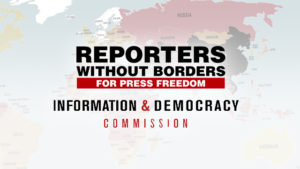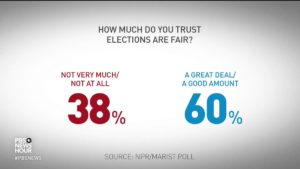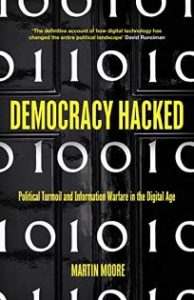 Russia Today, the Kremlin’s English language news network, is a “major concern”, the UK’s culture secretary said today, while calling on public broadcasters to defend democracy in the face of a “battle against disinformation,” The FT reports.
Russia Today, the Kremlin’s English language news network, is a “major concern”, the UK’s culture secretary said today, while calling on public broadcasters to defend democracy in the face of a “battle against disinformation,” The FT reports.
In a speech to the Royal Television Society, Jeremy Wright called out Russia for a “blatant disinformation campaign” following the poisoning of Sergei Skripal, a former UK spy, in Salisbury. “Russia has begun a blatant disinformation campaign with misleading procedural questions and over 40 different official narratives— all false,” said Wright. “Russia Today, funded by the Russian state, is a major concern,” he added, suggesting that it is time to square up to Russian propaganda.
 The Paris-based Reporters Without Borders or Reporters Sans Frontiéres (RSF) has launched an initiative to support and promote the flow of truthful information in the digital era, Rappler reports:
The Paris-based Reporters Without Borders or Reporters Sans Frontiéres (RSF) has launched an initiative to support and promote the flow of truthful information in the digital era, Rappler reports:
The initiative is anchored by the formation of the Information and Democracy Commission, an international panel made up of 25 advocates from 18 countries including top journalists, human rights lawyers, technology specialists, literary minds, and professors. Their goal is to draft the International Declaration on Information and Democracy – a set of principles, objectives and governance proposals intended to defend the free flow of information at a time when political powers, private interests and corporate actors are able to exert significant influence over it.
 Russian active measures are undermining faith in democratic institutions and processes, according to a new survey.
Russian active measures are undermining faith in democratic institutions and processes, according to a new survey.
An NPR-Marist poll released Monday shows US voters think it’s more likely that a foreign adversary would attack voter databases than actually alter the vote tallies — a sentiment consistent with experts’ assessment of the threat, The Washington Post reports.
Yet the increased awareness of security threats also shows voter confidence in the democratic process is taking a hit: About a third said Russia or another adversary is likely to change vote tallies and results, even though there’s no  evidence of this happening.
evidence of this happening.
Nearly 2 in 5 American voters do not believe elections are fair, according to according to the poll, while nearly half of respondents lack faith that votes will be counted accurately in the upcoming midterm elections.
 “I read these responses as showing the public has a fairly nuanced and sophisticated understanding of the risks we face,” said Lawrence Norden, an election security expert at the Brennan Center’s Democracy Program. “I think the majority of respondents have it right: The risks we face are risks, and we shouldn’t overstate them. At the same time, the risks are real, and we should be taking measures that would reduce them, such as replacing paperless electronic systems with systems that read paper ballots.”
“I read these responses as showing the public has a fairly nuanced and sophisticated understanding of the risks we face,” said Lawrence Norden, an election security expert at the Brennan Center’s Democracy Program. “I think the majority of respondents have it right: The risks we face are risks, and we shouldn’t overstate them. At the same time, the risks are real, and we should be taking measures that would reduce them, such as replacing paperless electronic systems with systems that read paper ballots.”
Digital technologies are re-shaping formal democratic procedures, such as the adoption of e-voting or the use of bots in election campaigns, notes McMaster University’s Digital Democracy workshop. They are also contributing to broader changes in the social contexts that support or undermine democracy, such as when governance shifts away from those formal and public procedures to Facebook’s terms of service or algorithms, or when the pace of change associated with digitization undermines or strengthens the capacity of citizens to engage with political issues.
 Co-chaired by Nobel peace laureate Shirin Ebadi and RSF secretary-general Christophe Deloire, the “Information and Democracy Commission” includes Nobel economics laureates Joseph Stiglitz and Amartya Sen, Peruvian novelist and Nobel literature laureate Mario Vargas Llosa and Nigerian human rights lawyer Hauwa Ibrahim, a recipient of the European Parliament’s Sakharov Prize, RSF adds:
Co-chaired by Nobel peace laureate Shirin Ebadi and RSF secretary-general Christophe Deloire, the “Information and Democracy Commission” includes Nobel economics laureates Joseph Stiglitz and Amartya Sen, Peruvian novelist and Nobel literature laureate Mario Vargas Llosa and Nigerian human rights lawyer Hauwa Ibrahim, a recipient of the European Parliament’s Sakharov Prize, RSF adds:
 The Commission also includes Abdou Diouf, a former president of Senegal and former secretary-general of the International Organization of the Francophonie; Navi Pillay, a South African lawyer and former UN High Commissioner for Human Rights; Francis Fukuyama, a US political scientist, essayist and Stanford University professor [and National Endowment for Democracy board member]; Mireille Delmas Marty, a French jurist and Collège de France honorary professor; and Teng Biao, a Chinese human rights lawyer.
The Commission also includes Abdou Diouf, a former president of Senegal and former secretary-general of the International Organization of the Francophonie; Navi Pillay, a South African lawyer and former UN High Commissioner for Human Rights; Francis Fukuyama, a US political scientist, essayist and Stanford University professor [and National Endowment for Democracy board member]; Mireille Delmas Marty, a French jurist and Collège de France honorary professor; and Teng Biao, a Chinese human rights lawyer.
It includes these leading journalists: Can Dündar (Turkey), Maria Ressa (Philippines), Ulrik Haagerup (Denmark), Ann Marie Lipinski and Marina Walker (United States), Aidan White (United Kingdom) and Mikhail Zygar (Russia) and Adam Michnik (Poland), as well as the following technology specialists: Harvard professor Yochai Benkler; Emily Bell, the director of the University of Columbia’s Tow Center; Antoine Petit, the head of France’s National Centre for Scientific Research (CNRS); Eli Pariser, the founder of the website Upworthy and co-founder of Avaaz; the Italian researcher Primavera de Filippi; and Nighat Dad, the founder of Pakistan’s Digital Rights Foundation.







